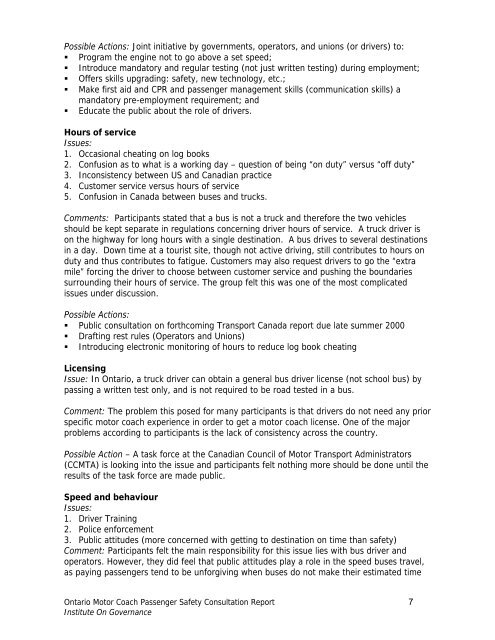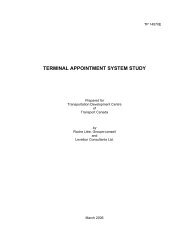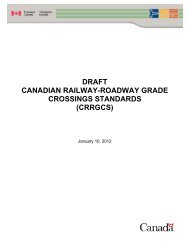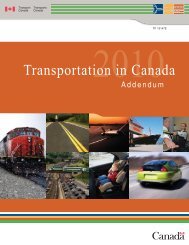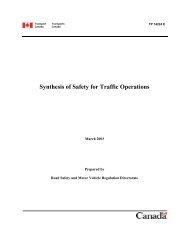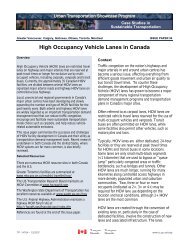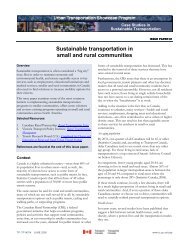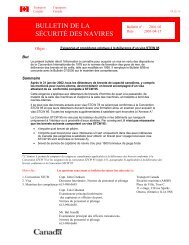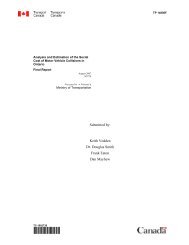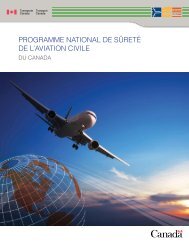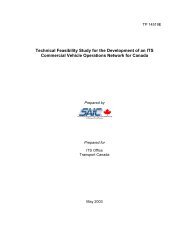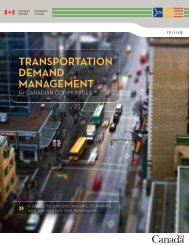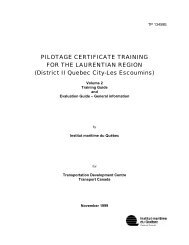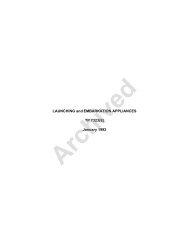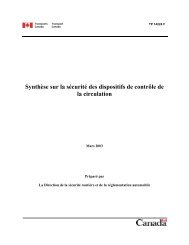Ontario Motor Coach Passenger Safety Consultation - Report -
Ontario Motor Coach Passenger Safety Consultation - Report -
Ontario Motor Coach Passenger Safety Consultation - Report -
Create successful ePaper yourself
Turn your PDF publications into a flip-book with our unique Google optimized e-Paper software.
Possible Actions: Joint initiative by governments, operators, and unions (or drivers) to:<br />
• Program the engine not to go above a set speed;<br />
• Introduce mandatory and regular testing (not just written testing) during employment;<br />
• Offers skills upgrading: safety, new technology, etc.;<br />
• Make first aid and CPR and passenger management skills (communication skills) a<br />
mandatory pre-employment requirement; and<br />
• Educate the public about the role of drivers.<br />
Hours of service<br />
Issues:<br />
1. Occasional cheating on log books<br />
2. Confusion as to what is a working day – question of being “on duty” versus “off duty”<br />
3. Inconsistency between US and Canadian practice<br />
4. Customer service versus hours of service<br />
5. Confusion in Canada between buses and trucks.<br />
Comments: Participants stated that a bus is not a truck and therefore the two vehicles<br />
should be kept separate in regulations concerning driver hours of service. A truck driver is<br />
on the highway for long hours with a single destination. A bus drives to several destinations<br />
in a day. Down time at a tourist site, though not active driving, still contributes to hours on<br />
duty and thus contributes to fatigue. Customers may also request drivers to go the “extra<br />
mile” forcing the driver to choose between customer service and pushing the boundaries<br />
surrounding their hours of service. The group felt this was one of the most complicated<br />
issues under discussion.<br />
Possible Actions:<br />
• Public consultation on forthcoming Transport Canada report due late summer 2000<br />
• Drafting rest rules (Operators and Unions)<br />
• Introducing electronic monitoring of hours to reduce log book cheating<br />
Licensing<br />
Issue: In <strong>Ontario</strong>, a truck driver can obtain a general bus driver license (not school bus) by<br />
passing a written test only, and is not required to be road tested in a bus.<br />
Comment: The problem this posed for many participants is that drivers do not need any prior<br />
specific motor coach experience in order to get a motor coach license. One of the major<br />
problems according to participants is the lack of consistency across the country.<br />
Possible Action – A task force at the Canadian Council of <strong>Motor</strong> Transport Administrators<br />
(CCMTA) is looking into the issue and participants felt nothing more should be done until the<br />
results of the task force are made public.<br />
Speed and behaviour<br />
Issues:<br />
1. Driver Training<br />
2. Police enforcement<br />
3. Public attitudes (more concerned with getting to destination on time than safety)<br />
Comment: Participants felt the main responsibility for this issue lies with bus driver and<br />
operators. However, they did feel that public attitudes play a role in the speed buses travel,<br />
as paying passengers tend to be unforgiving when buses do not make their estimated time<br />
<strong>Ontario</strong> <strong>Motor</strong> <strong>Coach</strong> <strong>Passenger</strong> <strong>Safety</strong> <strong>Consultation</strong> <strong>Report</strong> 7<br />
Institute On Governance


